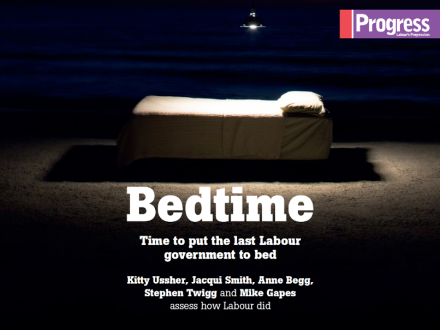
The last Labour Government should not be the inspiration for the next, according to Progress, in the latest move to suggest the organisation are looking to put their New Labour image behind them.
Progress dropped the use of ‘New Labour’ last May, and last month published an editorial declaring that “the era of New Labour is over”.
In a new pamphlet called ‘Bedtime’, published today, five MPs who served during Labour’s time in power assess the the Blair and Brown governments’ record in different policy areas, while Progress director Richard Angell argues that the party cannot risk looking like it wants to “pick up where it left off”.
While still celebrating the achievements of 1997 to 2010, Angell says the party “must move out of the shadow of the last Labour government. We must, therefore, put the last government – respectfully and resolutely – to bed.”
In the pamphlet’s conclusion, he argues that “the party – and its modernising tradition – must make clear it is not looking to pick up where it left off in 2007 or 2010 but to be more outward-looking in its approach and more ambitious in its scope.” He writes:
“The last Labour government should be the inspiration to be in government again, not the inspiration for the next government.”
This is the latest sign that Progress are attempting to re-cast themselves, acknowledging that the Labour Party membership has moved on – especially since this summer’s election of Jeremy Corbyn. It seems the organisation will be trying to branch out past its support base, and is trying to ditch some of the perceptions people has about it in order to do this.
They are not alone: senior Blairite members of the last Labour Government are privately trying to bury old hatchets, believing that the new era of Labour politics makes many old divisions obsolete. Could we begin to see new unlikely alliances form?





More from LabourList
Government announce SEND reform in schools white paper
SPONSORED: ‘Industrial hemp and the challenge of turning Labour’s priorities into practice’
‘A day is a long time in politics, so we need ‘action this day’’